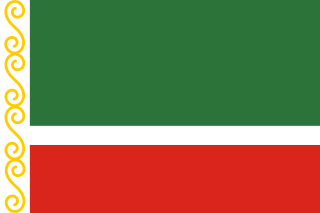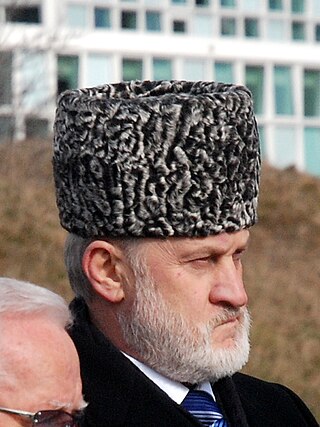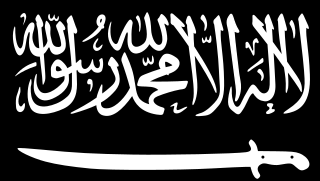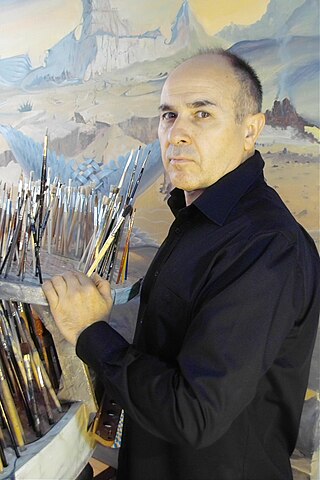Related Research Articles

Chechnya, officially the Chechen Republic, is a republic of Russia. It is situated in the North Caucasus of Eastern Europe, between the Caspian Sea and Black Sea. The republic forms a part of the North Caucasian Federal District, and shares land borders with Georgia to its south; with the Russian republics of Dagestan, Ingushetia, and North Ossetia–Alania to its east, north, and west; and with Stavropol Krai to its northwest.

Grozny is the capital city of Chechnya, Russia.

The First Chechen War, also referred to as the First Russo-Chechen War, was a struggle for independence waged by the Chechen Republic of Ichkeria against the Russian Federation from 11 December 1994 to 31 August 1996. This conflict was preceded by the battle of Grozny in November 1994, during which Russia covertly sought to overthrow the new Chechen government. Following the intense Battle of Grozny in 1994–1995, which concluded with a pyrrhic victory for the Russian federal forces, Russia's subsequent efforts to establish control over the remaining lowlands and mountainous regions of Chechnya were met with fierce resistance and frequent surprise raids by Chechen guerrillas. The recapture of Grozny in 1996 played a part in the Khasavyurt Accord (ceasefire), and the signing of the 1997 Russia–Chechnya Peace Treaty.

Akhmed Halidovich Zakayev is a Chechen statesman, political and military figure of the unrecognised Chechen Republic of Ichkeria (ChRI). Having previously been a Deputy Prime Minister, he now serves as Prime Minister of the ChRI government-in-exile. He was also the Foreign Minister of the Ichkerian government, appointed by Aslan Maskhadov shortly after his 1997 election, and again in 2006 by Abdul Halim Sadulayev. An active participant in the Russian-Chechen wars, Zakayev took part in the battles for Grozny and the defense of Goyskoye, along with other military operations, as well as in high-level negotiations with the Russian side.

The Second Chechen War took place in Chechnya and the border regions of the North Caucasus between the Russian Federation and the breakaway Chechen Republic of Ichkeria, from August 1999 to April 2009.
Chechen is a Northeast Caucasian language spoken by approximately 1.8 million people, mostly in the Chechen Republic and by members of the Chechen diaspora throughout Russia and the rest of Europe, Jordan, Austria, Turkey, Azerbaijan, Ukraine, Central Asia and Georgia.

Akhmat-Khadzhi Abdulkhamidovich Kadyrov was a Russian politician and revolutionary who served as Chief Mufti of the Chechen Republic of Ichkeria in the 1990s during and after the First Chechen War. At the outbreak of the Second Chechen War he switched sides, offering his service to the Russian government, and later became the President of the Chechen Republic from 5 October 2003, having acted as head of administration since July 2000.

Shamil Salmanovich Basayev, also known by his kunya "Abu Idris", was a Chechen guerilla leader who served as a senior military commander in the breakaway Chechen Republic of Ichkeria. He held the rank of brigadier general in the Armed Forces of Ichkeria, and was posthumously declared generalissimo. As a military commander in the separatist armed forces of Chechnya, one of his most notable battles was the separatist recapture of Grozny in 1996, which he personally planned and commanded together with Aslan Maskhadov. He also masterminded several of the worst terrorist attacks that occurred in Russia.

The Chechens, historically also known as Kisti and Durdzuks, are a Northeast Caucasian ethnic group of the Nakh peoples native to the North Caucasus. They are the largest ethnic group in the region and refer to themselves as Nokhchiy. The vast majority of Chechens are Muslims and live in Chechnya, an autonomous republic within the Russian Federation.

Ramzan Akhmatovich Kadyrov is a Russian politician and current Head of the Chechen Republic. He was formerly affiliated with the Chechen independence movement, through his father who was the separatist-appointed mufti of Chechnya. He is a colonel general in the Russian military.

The Chechen Republic of Ichkeria, known simply as Ichkeria, and also known as Chechnya, was a de facto state that controlled most of the former Checheno-Ingush ASSR from 1991 to 2000 and has been a government-in-exile since.

The deportation of the Chechens and Ingush, or Ardakhar Genocide, and also known as Operation Lentil, was the Soviet forced transfer of the whole of the Vainakh populations of the North Caucasus to Central Asia on 23 February 1944, during World War II. The expulsion was ordered by NKVD chief Lavrentiy Beria after approval by Soviet leader Joseph Stalin and Anastas Mikoyan, as a part of a Soviet forced settlement program and population transfer that affected several million members of ethnic minorities in the Soviet Union between the 1930s and the 1950s.

The Caucasus Emirate, also known as the Caucasian Emirate, Emirate of Caucasus, or Islamic Emirate of the Caucasus, was a jihadist organisation active in rebel-held parts of Syria and previously in the North Caucasus region of Russia. Its intention was to expel the Russian presence from the North Caucasus and to establish an independent Islamic emirate in the region. The Caucasus Emirate also referred to the state that the group sought to establish. The creation of Caucasus Emirate was announced on 7 October 2007, by Chechen warlord Dokka Umarov, who became its first self-declared "emir".
Umar Sharpuddievich Israilov was a former bodyguard of Chechen President Ramzan Kadyrov who became a critic of the Chechen government. He was shot and killed in exile in Vienna, Austria on January 13, 2009.

The Chechen–Russian conflict was the centuries-long ethnic and political conflict, often armed, between the Russian, Soviet and Imperial Russian governments and various Chechen forces. The recent phase of the conflict started after the dissolution of the Soviet Union in 1991 and ended with the oppression of Chechen separatist leaders and crushing of the separatist movement in the republic proper in 2017.

Ukrainian volunteer battalions were militias and paramilitary groups mobilized as a response to the perceived state of weakness and unwillingness of the regular Armed Forces to counter rising separatism in spring 2014. They trace their origins to the "Maidan Self-Defense" militias formed during the Euromaidan in 2013. The earliest of these volunteer units were later formalized into military, special police and paramilitary formations in a response to the Russian military intervention in Ukraine in 2014. Most of the formations were formed or placed under command of the Ministry of Internal Affairs — as "Special Tasks Patrol Police" — and Ministry of Defence — as "Territorial defence battalions". A minority of battalions were independent of state control.

Ajnad al-Kavkaz is a Chechen-led Salafi jihadist militant group in northwestern Syria, operating primarily in the mountainous and forested areas of Latakia Governorate. Although it was formed by former fighters of the Caucasus Emirate and was tentatively linked to the organization, AK operated autonomously from the beginning and later cut ties with the Caucasus Emirate. Though it had become "the largest of the Muslim factions from the former Soviet Union fighting in Syria" by September 2016, AK's activity dwindled in the following years. In 2022, the group's centre of operations shifted from Syria to Ukraine, as most AK militants had begun mobilizing to fight against the Russian invasion of Ukraine. As of 2023, AK has largely been engaged in the Battle of Bakhmut in Ukraine.

Zamir Tagirovich Yushaev is a Chechen artist currently residing in Leipzig, Germany. He is a member of the Union of Artists of Germany.
Anti-Chechen sentiment, Chechenophobia, anti-Chechenism, or Nokhchophobia, refers to fear, dislike, hostility, hatred, discrimination, and racism towards ethnic Chechens, the Chechen language, or the Chechen culture in general. Anti-Chechen sentiment has been historically strong in Russia, and to some degree has spread to other countries in the former Soviet Union, such as Azerbaijan, to Europe, the Middle East, and to the United States. For decades, the main causes of hatred against Chechens have been largely due to the created narrative which depicts a violent mentality of Chechens, the association of Chechens with Islamic extremism, and Russian imperialist propaganda targeted at Chechens.
The Chechen Republic, commonly known as Chechnya, is a federal republic of Russia that has been noted in several roles during the Russian invasion of Ukraine. Kadyrovite forces have fought alongside the Russian forces, while several Chechen armed volunteer formations are fighting on the Ukrainian side. International observers have noted a number of comparisons between the invasion and the First and Second Chechen Wars.